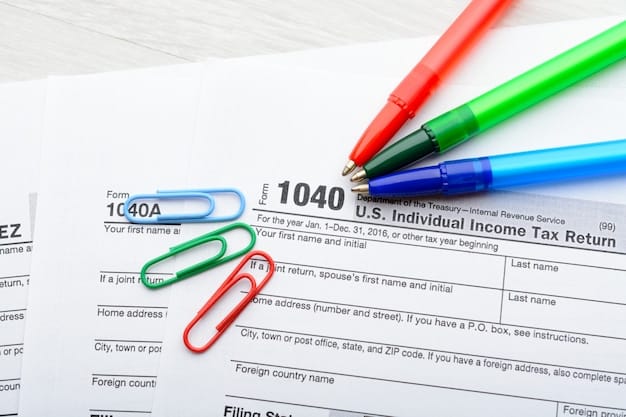Tax Implications of Debt Forgiveness: What You Need to Know

Understanding the tax implications of debt forgiveness is crucial before accepting a settlement, as the forgiven amount is often considered taxable income by the IRS, potentially impacting your financial situation.
Anúncios
Dealing with debt can be overwhelming, and the prospect of debt forgiveness might seem like a lifeline. However, it’s essential to understand the **tax implications of debt forgiveness: what you need to know before accepting a settlement**. This article will guide you through the potential tax consequences and help you make informed decisions.
Understanding Debt Forgiveness and Its Taxable Nature
Debt forgiveness occurs when a lender agrees to cancel all or part of what you owe. While it provides immediate relief, the IRS often views the forgiven amount as taxable income. This is because the money you borrowed was initially not taxed, but now that you don’t have to repay it, it’s treated as income.
What Constitutes Debt Forgiveness?
Debt forgiveness can take various forms, including cancellation of debt (COD), debt settlement, and debt discharge in bankruptcy. Each of these situations can trigger tax implications.
The General Rule: Forgiven Debt as Taxable Income
In most cases, the amount of debt forgiven is considered ordinary income and is taxable at your individual income tax rate. This means you’ll need to report it on your tax return for the year the debt was forgiven.
The lender who forgives the debt is typically required to send you a Form 1099-C, Cancellation of Debt, which reports the amount of debt forgiven to both you and the IRS. It’s important to carefully review this form and understand its implications.
- Confirm accuracy of the forgiven amount reported on Form 1099-C.
- Consult with a tax professional.
- Keep the 1099-C form.
Understanding the basic principles of debt forgiveness and its taxability is the first step toward navigating this complex financial situation. By being informed, you can prepare for potential tax liabilities and explore available options for minimizing their impact.
Common Types of Debt Forgiveness and Their Tax Implications
Different types of debt forgiveness have unique characteristics and potential tax implications. Knowing these nuances can help you better understand your specific situation.
Credit Card Debt Forgiveness
If a credit card company forgives a portion of your debt, the forgiven amount is generally considered taxable income. This is a common scenario for individuals struggling with high credit card balances.
Mortgage Debt Forgiveness
Mortgage debt forgiveness can occur through foreclosure, short sale, or loan modification. The tax implications vary depending on the circumstances and whether you qualify for any exclusions, such as the Mortgage Debt Relief Act (which has specific rules and limitations).
Student Loan Forgiveness
Student loan forgiveness programs, such as Public Service Loan Forgiveness (PSLF) and income-driven repayment (IDR) forgiveness, may or may not be taxable, depending on the specific program and current tax laws. Some programs offer tax-free forgiveness, while others may result in a taxable event.
Navigating the tax implications of different debt types requires careful consideration of the specific details of each situation. Understanding the rules and potential exclusions can help you minimize your tax liability and make informed decisions about debt relief options.
Exceptions and Exclusions to Taxable Debt Forgiveness
While debt forgiveness is generally taxable, certain exceptions and exclusions exist that can reduce or eliminate your tax liability. These provisions are designed to provide relief in specific circumstances.
Insolvency Exclusion
The insolvency exclusion allows you to exclude forgiven debt from taxable income if you are insolvent at the time the debt is forgiven. Insolvency means your total liabilities exceed your total assets.
Bankruptcy Exclusion
Debt discharged in bankruptcy is generally not considered taxable income. This exclusion provides relief for individuals who have filed for bankruptcy under Chapter 7 or Chapter 11.
Qualified Farm Debt Exclusion
Farmers who have qualified farm debt forgiven may be able to exclude it from taxable income, subject to certain limitations and requirements.
- Assess your eligibility for insolvency exclusion.
- Consider bankruptcy as a debt discharge strategy.
- Determine if the exemption is applicable for your debts.
Exploring these exceptions and exclusions is essential for determining your tax liability related to debt forgiveness. Consulting with a tax professional can help you assess your eligibility and navigate the required documentation.
Calculating Your Taxable Income from Debt Forgiveness
Calculating the amount of taxable income from debt forgiveness involves several steps, including determining the amount of debt forgiven and considering any applicable exclusions or deductions.
Determining the Amount of Debt Forgiven
The amount of debt forgiven is the difference between the amount you owed and the amount the lender agreed to cancel. This amount should be reported on Form 1099-C.
Considering Exclusions and Deductions
If you qualify for any exclusions, such as the insolvency exclusion or bankruptcy exclusion, you can reduce the amount of taxable income from debt forgiveness. You may also be able to deduct certain expenses related to the forgiven debt.
Accurately calculating your taxable income from debt forgiveness is crucial for complying with tax laws and avoiding penalties. Seeking professional guidance can help you navigate the complexities of this process and ensure you’re taking advantage of all available options.
Strategies for Minimizing the Tax Impact of Debt Forgiveness
Minimizing the tax impact of debt forgiveness requires proactive planning and strategic decision-making. Several strategies can help you reduce your tax liability and manage the financial consequences.
Negotiating with Lenders
Before accepting debt forgiveness, explore options for negotiating with lenders to reduce the amount of debt forgiven. This can lower your taxable income and overall tax burden.
Timing of Debt Forgiveness
Consider the timing of debt forgiveness and its potential impact on your overall tax situation. Strategically timing forgiveness can help you manage your income and deductions to minimize your tax liability.
Tax Planning and Professional Advice
Work with a tax professional to develop a comprehensive tax plan that addresses the implications of debt forgiveness. A qualified advisor can help you identify opportunities for minimizing your tax liability and maximizing your financial well-being.
- Contact your lender.
- Discuss the matter with a professional.
- Make a tax plan.
By implementing these strategies, you can proactively manage the tax impact of debt forgiveness and protect your financial interests. Seeking professional guidance is essential for developing a personalized plan that meets your specific needs and circumstances.
The Importance of Seeking Professional Tax Advice
Navigating the tax implications of debt forgiveness can be complex and challenging. Seeking professional tax advice is crucial for understanding your rights, obligations, and available options.
Benefits of Professional Tax Advice
A qualified tax advisor can provide expert guidance on tax laws, exclusions, and deductions related to debt forgiveness. They can also help you prepare and file your tax return accurately and efficiently.
Finding a Qualified Tax Advisor
When choosing a tax advisor, look for someone with experience in debt forgiveness and a strong understanding of tax laws. Check their credentials and references to ensure they are qualified to provide the advice you need.
Seeking professional tax advice is an investment in your financial well-being. A qualified advisor can help you navigate the complexities of debt forgiveness, minimize your tax liability, and make informed decisions about your financial future.
| Key Point | Brief Description |
|---|---|
| 📝 Taxable Income | Forgiven debt is generally considered taxable income by the IRS. |
| 💼 Insolvency Exclusion | You may exclude forgiven debt if you are insolvent when the debt is forgiven. |
| 🧑⚖️ Bankruptcy Exclusion | Debt discharged in bankruptcy is generally not considered taxable income. |
| 🤝 Professional Advice | Consult a tax professional for personalized guidance and planning. |
Frequently Asked Questions (FAQs)
Generally, yes, but there are exceptions like insolvency or bankruptcy, which may exclude the forgiven debt from being taxed.
Form 1099-C reports forgiven debt to the IRS and you; it’s crucial for accurately reporting any taxable income from debt forgiveness.
If you’re insolvent (liabilities exceed assets) when the debt is forgiven, you might be able to exclude the forgiven debt from your taxable income.
It depends on the program. Some, like Public Service Loan Forgiveness (PSLF), are tax-free, while others may be considered taxable income.
Negotiate with lenders, strategically time the debt forgiveness, and seek professional tax advice to create a comprehensive tax plan.
Conclusion
Understanding the tax implications of debt forgiveness is essential for making informed financial decisions. While forgiven debt is often considered taxable income, exceptions and strategies exist to minimize the tax impact. Seeking professional advice is vital for navigating the complexities and ensuring compliance with tax laws.







